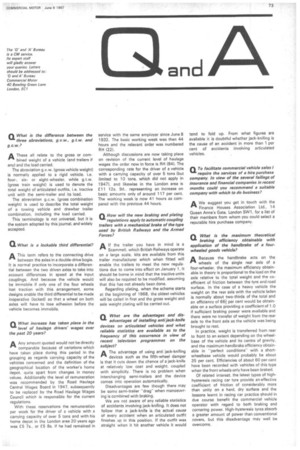Q What is the maximum theoretical braking efficiency obtainable with application of the handbrake of a fourwheeled goods vehicle?
Page 75

If you've noticed an error in this article please click here to report it so we can fix it.
ABecause the handbrake acts on the
wheels of the single rear axle of a four-wheeler, the maximum efficiency obtainable in theory is proportional to the load on the axle relative to the total weight and the coefficient of friction between the tyre and road surface. In the case of a heavy vehicle the weight on the rear axle with the vehicle laden is normally about two-thirds of the total and an efficiency of 66i per cent would be obtainable on a surface providing a coefficient of 1.0 if sufficient braking power were available and there were no transfer of weight from the rear axle to the front axle as the vehicle was being brought to rest.
In practice, weight is transferred from rear to front to an extent depending on the wheelbase of the vehicle and its centre of gravity, and the maximum handbrake efficiency obtainable in "perfect conditions" with a shortwheelbase vehicle would probably be about 35 per cent. Efficiencies of about 60 per cent have been recorded with vehicles of this type when the front wheels only have been braked.
Of related interest, the latest types of highhysteresis racing car tyre provide an effective coefficient of friction of considerably more than unity on a hard, dry surface and the lessons learnt in racing car practice should in due course benefit the commercial vehicle operator with regard to both braking and cornering power. High-hysteresis tyres absorb a greater amount of power than conventional covers, but this disadvantage may well be overcome.




























































































































